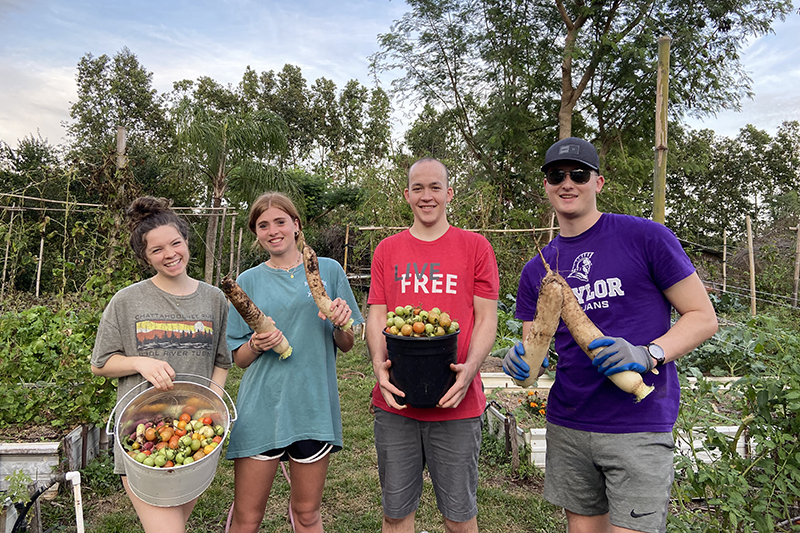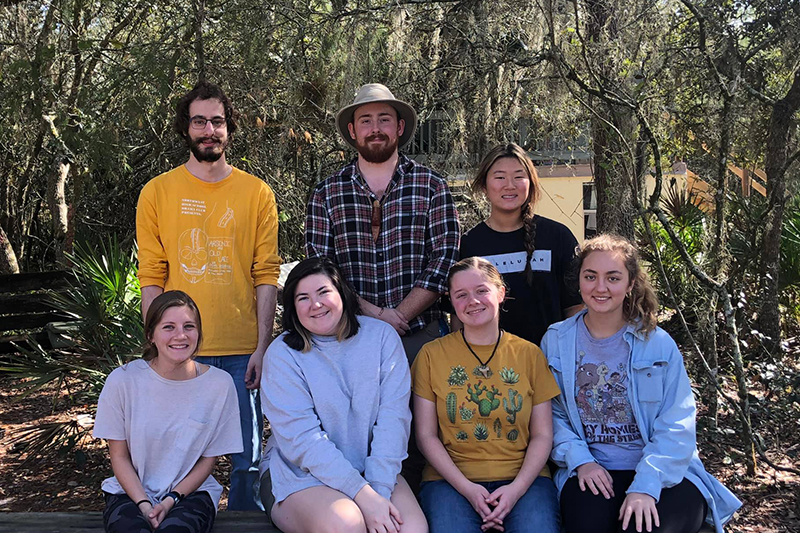- About
- Admissions
-
Academics
- Undergraduate Programs
- Pre-Major
-
Departments
- Overview
- Art Program
- Biblical Studies, Christian Ministries, Intercultural Studies & Philosophy Department
- Biology Program
- Business Department
- Chemistry Department
- Communication Department
- Computer Science & Engineering Department
- Education Department
- Engineering Program
- English Program
- Environmental Science & Sustainable Development Program
- Film & Media Program
- History, Global & Political Studies Department
- Kinesiology Department
- Mathematics Department
- Modern Languages Program
- Music Program
- Physics Program
- Psychology Department
- Social Work Program
- Sociology Program
- Theatre & Dance Program
- Liberal Arts
- Study Abroad
- Graduate Programs
- Online Programs & Licensures
- Special Programs
- Academic Enrichment Center
- Life at Taylor
Info For
HEART Village Gives Students Sustainability and Missions Experience

Interested in serving or living in the developing world? Thanks to a partnership with HEART Village in Lake Wales, Florida, Taylor students can get a taste of learning self-sustainability, right here in the United States.
HEART Village partners with Echo International for the purpose of preparing families and individuals for both developing-world conditions and self-sustainability anywhere God calls them. For years, Taylor students have gained experience in sustainability on the mission field at HEART Village through January term trips, practicums, and semester-long studies.
“It’s the best learning experience I’ve ever had,” said Natalie Staritz, a junior Sustainability Development major. “It’s primarily a simulated third-world village, and I’ve lived in a third-world country, so going and seeing how accurate they’ve gotten it, they’ve done a really good job.”
The trip is split into three portions: gardening, cooking, and animal care. While at HEART on a three-week J-term trip, Staritz did laundry by hand, retrieved water from a well, and made food from many different cultures.
Community Experience
ECHO’s North America Regional Impact Center Director Grace Ju Miller, who also served as Taylor’s Dean of Natural & Applied Sciences for five years, explained that HEART is primarily about community.
“When you’re there, you’ll meet missionaries who are about to go to Borneo, and their whole families train together for a year,” Miller said. “And what’s important is that all the individuals who are there have to live in community because that’s what happens when you are sent to remote places.”
HEART emphasizes building skills in decision-making, crisis management, and inter-relational issues within the community they’ve established. Students are asked to refrain from using their cell phones while working at HEART, mirroring a situation they might have to do in a location where access to communication infrastructure might be limited.

Gardening and Cooking
The first part of the HEART Village J-term trip is dedicated to growing and maintaining food. Taylor students have a similar gardening opportunity on campus as garden interns who care for a garden on campus over the summer.
Staritz herself was a garden intern at Taylor, where she tested different organic pesticides and got a broad education on sustainable gardening. At HEART, however, she was even more immersed in the reality of producing her own food.
There, she cared for the garden and relied on it for food. She had to prepare meals using the fruit of her labor, putting scraps in the compost, and wasting nothing. Even the cooking vessel she used for her cooking, a stove, was fashioned after the type used in many villages around the world.
When Staritz and other students wanted milk, there was goat’s milk. If they wanted cheese, they made it themselves. All food needed to be grown, cooked, preserved, and never wasted.
Animal Care
HEART’s realistic attitude about gardening also applies to their approach to animal husbandry. Students raise pigs, quail, chickens, and other animals for food. When it comes time to prepare that food, students and staff pray before the slaughter, thanking God for His provision.
Miller explained that seeing God’s provision as sacred changes the way students think about not only food but the world. They adopt a posture of gratitude and thanksgiving.
Even Staritz, who has raised chickens before, said that the combination of animal care, gardening, and food preparation was difficult for her. The work doesn’t stop after the slaughter, after all. The meat must be cut up, made into a sausage, and cooked. The process is meticulous but rewarding.
Impact
Through their education at Taylor and their experiences at HEART Village, students have been led to take on a wide variety of careers. Some students who have gone to graduate school for agriculture or have entered the mission field. One alumna was inspired to work in urban gardening in Atlanta with food security food agencies, and another became an attorney who does legal work for immigrants.
“It doesn’t mean that you become a farmer, but that you see what the needs of the world are,” Miller said. “I think that learning these things, whatever your major is and wherever God calls you, will impact the way you live your life and the way you steward your resources.”
Study Abroad Options at Taylor
Taylor students have had the opportunity to study abroad in Ecuador, Greece, Italy, Ireland, Los Angeles, Egypt, China, London, Malawi, Israel, and more so that they can pursue careers from missions to biology in a global context.
If you’re interested in January term or semester study abroad opportunities, schedule a visit and learn more about the opportunities Taylor provides!

